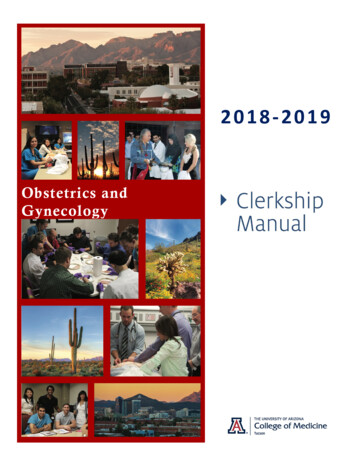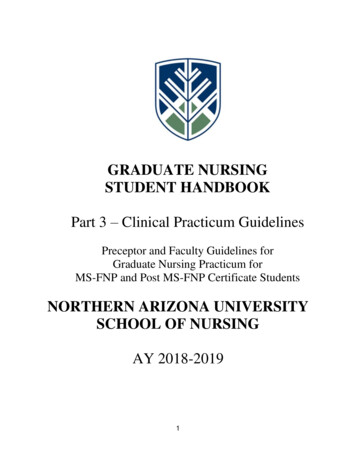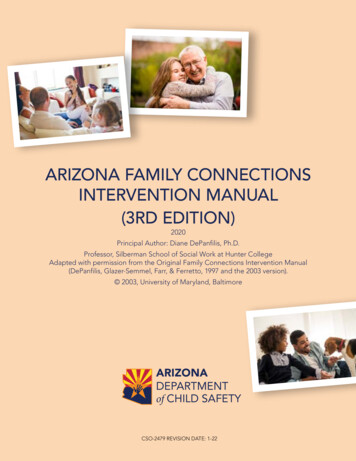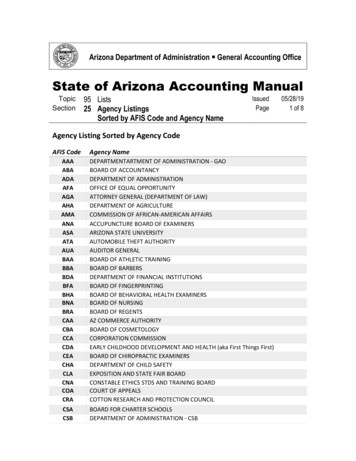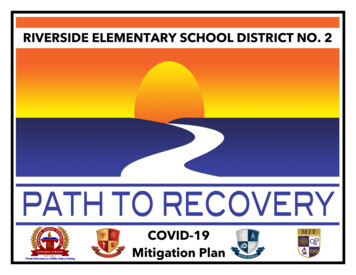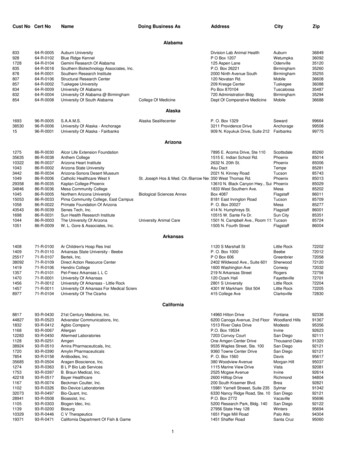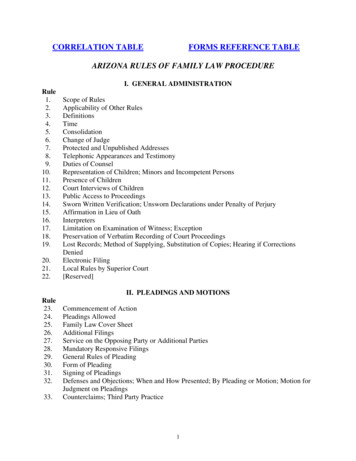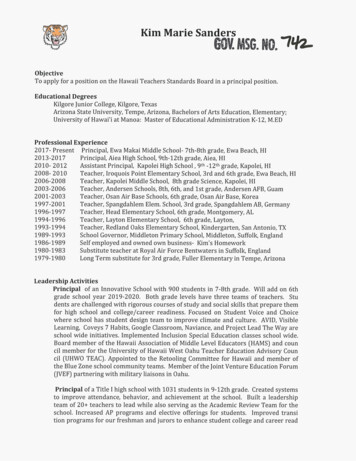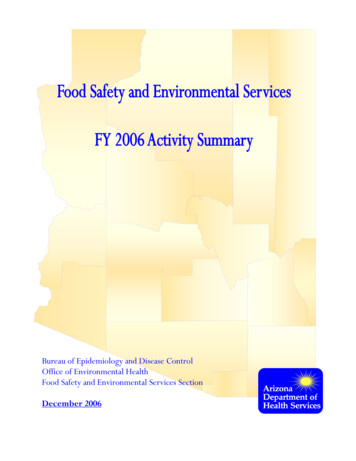
Transcription
Bureau of Epidemiology and Disease ControlOffice of Environmental HealthFood Safety and Environmental Services SectionDecember 2006
Janet Napolitano, GovernorState of ArizonaSusan GerardDirector, Arizona Department of Health ServicesARIZONA DEPARTMENT OF HEALTH SERVICESBureau of Epidemiology and Disease ControlOffice of Environmental HealthFood Safety and Environmental Services Section150 N. 18th Avenue, Suite 430Phoenix, Arizona 85007-3245(602) 364-3122This publication can be made available in alternative format.Please contact the number listed above.Permission to quote from or reproduce materials from this publicationis granted when due acknowledgment is made.“Equal Opportunity/Reasonable Accommodation Employer”
TABLE OF CONTENTSExecutive Summary . 1Section 1.0 – Introduction . 2Section 2.0 – FY 2006 Activities. 2Section 2.1 – Food Safety. 3Section 2.1.1 – Inspection Programs. 3Section 2.1.2 – Enforcement . 4Section 2.1.3 – Food Safety Accomplishments in Arizona. 4Section 2.1.4 – Food Safety Update . 5Section 2.1.5 – Food Biosecurity . 5Section 2.1.6 – Reports of Foodborne Illness. 7Section 2.2 – Bottled Water. 8Section 2.3 – Bathing Places . 8Section 2.4 – Public Accommodations. 9Section 2.5 – Trailer Coach Parks . 9Section 2.6 – School Grounds. 9Section 2.7 – Children’s Camps . 9Section 3.0 – Points of Interest. 10Section 4.0 – Registration and Training of Sanitarians. 10Section 5.0 – Summary . 11Appendix. 12
Executive SummaryThe Arizona Department of Health Services (ADHS) administers a statewide public health sanitationprogram for food safety, bottled water, public accommodations, e.g., hotels and motels, children’s camps,campgrounds, public schools, and public and semi-public bathing places. ADHS has delegated severalpublic health sanitation program responsibilities to each of the 15 Arizona county health departments inorder to most effectively accomplish its mission objectives.Individuals that carry out the provisions of the program must be licensed as a Registered Sanitarian in theState of Arizona or, under specific conditions, a Sanitarian Aide working under the direct supervision ofan Arizona Registered Sanitarian. There were 161 Registered Sanitarians and 25 Sanitarian Aidesemployed with the 15 Arizona county health departments and ADHS that were engaged in the publichealth sanitation program in Arizona during FY 2006.The following highlights FY 2006 activities. One hundred sixty one Registered Sanitarians and 25 Sanitarian Aides at ADHS and the 15 Arizonacounty health departments conducted 109,312 inspections at 50,092 regulated facilities in Arizona. There were 31,354 regulated food establishments in Arizona during FY 2006. A total of 72,006 foodsafety inspections, i.e., routine, re-inspection, and pre-operational, were conducted at thoseestablishments. An additional 5894 inspections were conducted at temporary food establishments.The total number of food program inspections reached 77,900. Eleven Arizona counties are participating in the FDA’s Voluntary National Retail Food RegulatoryProgram Standards. The program is designed to foster national uniformity among regulatoryprograms responsible for retail food protection. The program also provides data collection andcorrelation useful in program evaluation and improvement. The eleven participating counties areApache, Cochise, Coconino, Gila, Greenlee, La Paz, Maricopa, Mohave, Pima, Pinal, and Yavapai.1
1.0IntroductionThe Food Safety and Environmental Services Section of the Office of Environmental Health, ArizonaDepartment of Health Services (ADHS), has responsibility for administration and oversight of food safetyand environmental sanitation monitoring and enforcement in the State of Arizona in accordance withState law. The mission of the Food Safety and Environmental Services Section is:To prevent and control human illness related to the transmission of infectious agents or toxicsubstances in food and water, and to prevent disease transmission due to unsanitary conditions inhotels and motels, trailer coach parks, bathing places, group homes, behavioral health centers,adult foster care homes and children’s camps.The Food Safety and Environmental Services Section administers a statewide public health sanitationprogram which includes food safety, bottled water, public accommodations, e.g., hotels and motels,children’s camps, campgrounds, public schools, and public and semi-public bathing places. The programperforms epidemiological investigations, interprets public health sanitation laws and rules for Arizonacounty health departments and establishes and maintains liaisons with federal and local agencies.Arizona Department of Health Services150 BuildingPhoenix, Arizona2
2.0FY2006 ActivitiesADHS has delegated several public health sanitation program responsibilities to each of the 15 Arizonacounty health departments in order to most effectively and efficiently accomplish its mission objectives.The delegation of responsibilities allows local governments to maximize the level of services they providewith available resources and to choose the services most needed in their communities. Local controlencourages community interaction in program design and operation to meet community needs.Counties accepting delegated responsibilities are required to perform duties in accordance with conditionsoutlined in their specific delegation agreement with ADHS. County health departments must submitannual reports summarizing their program activities as required by their delegation agreements.Facilities regulated by the state and counties include various food establishments, bottled water facilities,public accommodations, e.g., hotels and motels, children’s camps, campgrounds, public school grounds,and public and semi-public bathing places. Personnel that carry out the provisions of the program mustbe licensed as a Registered Sanitarian in the State of Arizona or, under specific conditions, a SanitarianAide under the direct supervision of an Arizona Registered Sanitarian. One hundred sixty one RegisteredSanitarians and 25 Sanitarian Aides at the 15 Arizona county health departments and ADHS conducted109,312 inspections at the 50,092 regulated facilities in Arizona during FY2006.Number and Type of Facilities and Public Health Inspections in Arizona FY 20067348Bottled Water1303136945393027161416029991778Public AccomodationsChildren's CampsCamp GroundsPublic School GroundsTrailer Coach ParksPublic & Semi-Public Bathing PlacesInspectionsFacilities245091376077900Food Establishments3135402.1Food Safety2.1.1Inspection staurants, food markets, mobile food units, food processors, prison and jail eating facilities, foodwarehouses, bakeries, and school cafeterias are routinely inspected to evaluate food safety practices inthese establishments.There were 31,354 regulated food establishments in Arizona during FY2006, an increase of 7% from theprevious year. State and county sanitarians and sanitarian aides conducted 77,900 food safety3
inspections, i.e., routine, re-inspection, and pre-operational, at these facilities. This represents an 8%increase in the number of inspections conducted by 2% fewer inspectors.A classification scheme categorizes food establishments by the complexity of the food service operations.More complex operations conduct a greater variety of food service activities and may require morefrequent inspections in order to ensure that all food safety measures are being followed. Theclassification scheme is as follows:Complex The facility prepares and holds hot or cold food for more than 12 hours before serving; and/orThe facility cooks and cools a significant number of foods during the food handling process;and/orThe facility prepares food for off-site service; and/orThe facility vacuum packs food; and/orThe facility serves a highly susceptible population.Moderate The food prepared in the facility from raw ingredients requires minimal assembly; and/orHot or cold food preparation in the facility is restricted to same day service; and/orFoods requiring preparation in the facility are from approved processing facilities.Limited Only pre-packaged potentially hazardous foods are available or sold; and/orThe potentially hazardous foods served are commercially pre-packaged in an approved foodprocessing facility; and/orThe facility only has limited preparation of potentially hazardous foods and beverages; and/orThe facility only serves beverages.Food establishments in Arizona classified as high and medium complexity generally are inspected morefrequently than simple facilities. On average, there were 2.5 inspections per complex facility, 2.0inspections per medium facility and 1.5 inspections per simple facility. This pattern is consistent withADHS’ recommendations to inspect complex food service operations more frequently than simple foodservice facilities.4
Number of Food Establishments and Routine Inspections by Food ServiceComplexity FY 200635000300873000023057250002000015000Number of foodestablishmentsNumber of routineinspections1526395716528 he aim of the food safety inspection program is to achieve compliance with state food safetyrequirements without resorting to compliance proceedings and enforcement actions. Unfortunately, theseactions are sometimes necessary to achieve compliance with minimum requirements. During FY2006,820 enforcement actions were taken at food establishments in Arizona. Statewide, complianceproceedings or enforcement actions were taken at approximately 2.8% of food establishments.2.1.3Food Safety Activities in Arizona Eleven Arizona counties are now participating in the FDA’s Voluntary National Retail FoodRegulatory Program Standards. The program is designed to foster national uniformity amongregulatory programs responsible for retail food protection. The eleven counties participating areApache, Cochise, Coconino, Gila, Greenlee, La Paz, Maricopa, Mohave, Pima, Pinal, andYavapai. The Azsafefood Listserv developed in collaboration between ADHS and the University ofArizona Cooperative Extension Service maintains over 135 members. The Listserv was designedto serve as an easily accessible forum for individuals interested in food safety issues in Arizona.The majority of members are Registered Sanitarians from ADHS and the 15 Arizona countyhealth departments. The Listserv has also served as an important communication tools tobroadcast important food recall, food tampering, and related notices to Arizona county healthdepartments. ADHS Office of Environmental Health publishes and distributes an E-Newsletter through theAzsafefood Listserv and the ADHS web site targeting individuals interested and involved inpublic health sanitation issues in the State of Arizona.5
2.1.4Food Safety UpdateIn response to a statutory change that shifts regulatory authority for milk at the retail level to ADHS fromthe Arizona Department of Agriculture, associated rules were amended. The rule making process wascompleted in FY2006.2.1.5Food BiosecurityADHS implemented a statewide voluntary food biosecurity program in 2002 to increase awareness aboutfood biosecurity. On-site visits were made during FY 2005 by ADHS representatives to each of the 15Arizona counties to assist them in developing and delivering a local food biosecurity program. ADHSpersonnel provided presentations and training sessions addressing the importance of vulnerabilityassessments, biosecurity procedures, and emergency response plans. Assessments were performed onbiosecurity procedures already in place for produce warehouses and a large drinking water distributionsystem in Arizona. Guidance and educational materials were provided during on-site visits. ADHS willcontinue to assist in the development and delivery of the voluntary food biosecurity program tailored tomeet each county’s needs.Food Defense AccomplishmentsPartnership with state and federal agencies.Open lines of communication and a solid working relationship were established with the Department ofAgriculture, ADEQ, the Department of Education, FBI, USDA and FDA regarding food defense. Effortsfostered improved collaborations and communications between state and federal agencies.Liaison with Federal AgenciesThe ADHS food biosecurity specialist acts as a liaison between federal agencies and the counties. It ismore convenient for FDA, USDA, FBI and other federal agencies to have one single contact per statewith regards to food defense issues. The role of the ADHS food biosecurity specialist is to share theinformation coming from federal agencies with the counties, as well as to inform the federal agenciesabout the specific needs of the counties.FBI - Agroterror WorkgroupThe food biosecurity specialist is a member of the Agroterror Workgroup Committee lead by the FBIWMD coordinator. The committee consists of representatives from the ACTIC (Arizona CounterTerrorism Information Center), ADA, USDA, and FBI and meets on quarterly basis to discussagroterrorism issues and opportunities for interconnectivity between agencies.Partnership with the WIFSSIn 2005, ADHS initiated collaboration with the Western Institute for Food Safety and Security (WIFSS)at the University of California- Davis to provide training on agroterrorism. The WIFSS is a trainingpartner of the Office of Domestic Preparedness, U.S. DHS and is tasked with the development anddelivery of ODP certified courses on agroterrorism.On February 8 2006, the WIFSS presented the course "Understanding the Dangers of Agroterrorism" atthe Arizona State University Downtown Center. The ADHS food biosecurity specialist organized thisevent. The AZ Department of Agriculture helped getting the word out to the agricultural community.The audience included 75 participants representing ADHS, ADA, USDA, FDA, FBI, county healthdepartment, county environmental health, 91st CST National Guard, University of Arizona Diagnostic6
Lab, veterinarians, emergency service representatives, university academia, and the private industry(produce growers, cattle feedlot, dairy plants, egg farm).The training focused on existing local emergency teams and others who must respond to an agroterrorismevent in a coordinated manner with state and federal antiterrorism teams. Instruction also included threespecific scenarios: intentional contamination of crop, intentional introduction of an animal disease into alarge dairy herd and, intentional contamination of pasteurized juice at the packing plant with a selectagent.ADHS and ADA are working together to provide additional training opportunities in other regions inArizona:Course 1 “Understanding the Dangers of Agroterrorism”Southern region (Nogales and Yuma) - Winter 2006Northern region (Apache and Navajo counties, including the tribes) – Summer/Fall 2007Course 2 “Principles of Preparedness for Agroterrorism and Food Systems’ DisasterPhoenix – Winter 2006SPPA Initiative – Infant Formula AssessmentThe Strategic Partnership Program Agroterrorism (SPPA) Initiative is a joint effort of the Department ofHomeland Security (DHS), U.S. Department of Agriculture (USDA), Food and Drug Administration(FDA), and the Federal Bureau of Investigation (FBI) with private industry and the States announced inJuly 2005.The primary purpose of this assessment is to validate or identify vulnerabilities of the infant formulamanufacturing process and to foster increased communication between industry and various Governmentagencies related to food defense.On June 12-14, 2006 a team comprised of FDA, USDA, FBI, DHS, ADHS, ADA, Pinal County HealthDepartment, and the infant formula industry representatives conducted a vulnerability assessment inPhoenix, Arizona, using the CARVER-shock method. Efforts were made by ADHS to include arepresentative of the Pinal County Health Department to this assessment.Vulnerability assessments have been conducted in other states for other critical nodes such as:- Central kitchen for the National School Lunch Programs (NC)- Egg industry (PA)- Grain elevators (New Orleans, LA)- Frozen foods (WI and FL)- Swine industry (Iowa)The ADHS food biosecurity specialist obtained a copy of the NC Health Department working papers ofthe central kitchen assessment project in order to share pertinent information with county counterparts.Training Sessions and Conferences on Food BiosecuritySeveral associations and industry representatives have requested the ADHS food biosecurity specialist togive a presentation: Arizona Chapter of the Refrigeration Engineers and Technicians Association, Phoenix – 2006 Annual Convention of the International Packaged Ice Association, Tucson, AZ - Nov. 2006 “Ammonia Awareness Day”, Yuma, AZ - February 2006 Workshop “School Nurses Responding to the Challenges of Foodborne illnesses” presented by theAmerican Nurses Foundation, Scottsdale, AZ - December 2005 10th Annual New Mexico Environmental Health Conference, Albuquerque, NM – Nov. 20057
Workshop “The New HACCP Requirements: Implementing Your School Food Safety Program”presented by the AZ Department of Education; Yuma, Tucson and Phoenix, 2005 Phoenix Infragard Chapter, June 2005 (Phoenix InfraGard is an alliance between the Phoenix Office ofthe FBI and representatives of all infrastructure sectors, public and private, committed to protecting thenation's infrastructure) Second Annual Sanitarians Conference, Phoenix, AZ – October 2005 Institutional Biosafety Committee - University of Arizona, Tucson, AZ - October 2005ADHS personnel attended several training courses related to emergency response following aradiological, biological or chemical incident having an impact on food and water supplies. Thesetrainings included: Emergency Response to Domestic Biological Incidents, Radiation Monitoring,Radiation Emergency Response, Emergency Response to Threats of Intentional Contamination of PublicWater Supplies, EPA- Hazardous Materials Incidents Response Operations, and FEMA - NationalIncident Management System.Open lines of communication and a solid working relationship were established with other state andfederal agencies involved in the protection of food and water supplies from intentional contaminationincluding: Arizona Department of Environmental Quality, Arizona Department of Agriculture, ArizonaDepartment of Education, Arizona Food Safety Task Force, Office of Homeland Security and Food andDrug Administration. Contacts were established with the Western Institute on Food Safety and Securityfrom the University of California- Davis.Efforts will be directed at encouraging operators of food establishments and school foodservice personnelto implement biosecurity procedures and to create individualized emergency plans. Training sessions,conference, tabletop exercises and scenario-driven discussions will be presented in the next fiscal year toexpand the expertise in food biosecurity in Arizona.2.1.6Reports of Foodborne IllnessesThere were 412 foodborne illness complaints received by Environmental Health Departments in FY2006.The Arizona Department of Health Services conducts surveillance for foodborne illnesses and otherenteric diseases and helps the county health departments conduct additional investigations of diseaseoutbreaks. Environmental investigations, including a focused inspection, are conducted whengastrointestinal diseases are suspected to be associated with a foodborne illness. When a link betweenfoodborne illness and a food establishment is made a detailed investigation in conducted to determine thesource.8
Arizona Department of Health ServicesState LaboratoryPhoenix, Arizona2.2Bottled WaterFacilities that bottle water for distribution in Arizona are routinely inspected to evaluate the sanitationpractices. There were 48 bottled water facilities in Arizona in FY2006. State and county sanitariansconducted 78 inspections in these facilities during FY2006.Bottled Water Plants - Facilities & Inspectionsin Arizona797880446048FY 2005FY 200640200Number of Bottled WaterPlants2.3Number of InspectionsBathing PlacesPublic and semipublic swimming pools and spas, as well as a few natural bathing places, are routinelyinspected to evaluate whether these facilities are operated so that they prevent the spread of disease.9
The rules apply only to the sanitary conditions of public and semipublic swimming pools and bathingplaces. A swimming pool or bathing place is “public” if it is open to members of the general public,regardless of whether a fee is charged for admission. A swimming pool or bathing place is “semipublic”if it is operated in conjunction with a lodging such as a hotel, motel, resort, apartment, townhouse orcondominium complex, trailer court, mobile home park, or recreational vehicle park.There were 13,760 public and semipublic swimming pools and spas in Arizona in FY2006. State andcounty officials conducted 25,360 bathing place inspections. State and county health departmentsimplemented 2512 enforcement actions at bathing places in FY2006.Swimming Pools & Spas - Number & Inspectionin Arizona25360300002035225000200001326513760FY 200515000FY 20061000050000Number of Pools and Spas2.4Number of InspectionsPublic AccommodationsPublic accommodations such as hotels, motels, and boarding houses are routinely inspected to evaluatesanitation practices. There were 1369 public accommodations in Arizona in FY2006. State and countysanitarians conducted 1412 inspections in these facilities. State and county health departments made 16enforcement actions at public accommodations in FY2006.Public Accomodations - Number of Facilities and Inspections in 9FY 2005FY 2006Number of Hotels & MotelsNumber of Inspections10
2.5Trailer Coach ParksTrailer coach parks are routinely inspected for general sanitation practices including, but not limited to,garbage and trash removal, sewerage connections, and water and wastewater. There were 1778 trailerparks in Arizona in FY2006. State and county sanitarians conducted 2135 inspections in these facilities.State and county health departments made 19 enforcement actions at trailer coach parks in FY2006.Trailer Parks - Number of Facilities and Inspectionsin Arizona2500179020472135177820001500FY 2005FY 200610005000Number of Trailer Parks2.6Number of InspectionsPublic SchoolsPublic schools, including charter schools, are routinely inspected to determine whether they are incompliance with sanitation requirements. The inspections focus primarily on general sanitation includinggarbage and trash removal, drinking fountains, locker rooms, and restrooms. Cafeterias at the schools areconsidered food establishments and inspections are made under the food safety program (see Section 2.1).In accordance with the five-year-review report approved by the Governor’s Regulatory Review Council,ADHS revised the public school sanitation rules. The changes made the rules consistent with currentstatutes, corrected outdated citations to related administrative rules, made clear that the rules pertain onlyto public schools and conform to the rulemaking format and style requirements. The rules revisionprocess was completed in early FY 2006.There were 1694 public schools in Arizona in FY 2006. State and county sanitarians conducted 1788inspections in the schools. State and county health departments implemented 2 enforcement actions atpublic schools in FY2006.11
Number of Public School Grounds & Inspectionsin Arizona178917881800175016941700FY 2005FY 2006166616501600Number of Public Schools2.7Number of InspectionsChildren’s CampsChildren’s camps are routinely inspected to determine if they are in compliance with sanitation and foodsafety requirements. The inspections focus primarily on general sanitation including garbage and trashremoval, restrooms, and sleeping quarters. Inspections are also conducted at the food service kitchens.Inspections for children’s camps are tracked by annual year rather than by fiscal year since the camps areopen seasonally in the summer months of June to September. Tracking by annual year allows for moreeffective management of children’s camp inspections.There were 39 children’s camps that applied for an annual permit. Most of the camps are located in ruralcounties. Some of the camps operate for several months during the summer, while others may operate foronly a few days.Forty-five inspections of children’s camps where conducted during FY2006. No enforcement actionswere necessary at a children’s camp in FY2006.3.0Points of InterestCounty and state Registered Sanitarians and Sanitarian Aides provided increased vector control activitiesin response to West Nile Virus emergency response services and related activities during FY2006.Despite the added workloads and assignments in this important activity, inspection frequencies asoutlined in the county delegation agreements were achieved during FY2006.The ADHS Food Biosecurity Program established cooperative relationships with numerous industryrepresentatives and agencies and departments at all levels of government.FDA Voluntary National Retail Food Regulatory Standards Program participants include 11 of the 15Arizona County Environmental Health Departments and 1 Native American Tribe. Five countyparticipants have met 3 or more standards. All of the participants are progressing toward meeting initialstandards. The program enjoys very strong County Health Department support.12
4.0Registration and Training of SanitariansArizona law requires an individual shall not be employed as a sanitarian by the State or any politicalsubdivision of the State unless that person is registered by ADHS as a sanitarian. The director of ADHSappoints members to serve on the Arizona Sanitarian’s Council. The Council provides for theclassification of sanitarians, standards for sanitarians, and provides for the examination of applicants forregistration as sanitarians. During FY 2006, 47 applications were received and 44 of those were acceptedby the Council to take the examination. Of those 44 applicants, 29 passed the examination and becameregistered as sanitarians. Four hundred seven (407) current Arizona Registered Sanitarians renewed theirregistration for calendar year 2006.Individuals responsible for carrying out the provisions in the ADHS delegation agreement must beregistered as a sanitarian in the State of Arizona or, under specific conditions, a Sanitarian Aide under thedirect supervision of an Arizona Registered Sanitarian. There were 161 Registered Sanitarians employedat the 15 Arizona county health departments and ADHS involved in ADHS delegated activities. Twelvesanitarians have been standardized in the new food code requirements. Standardization is a process bywhich experienced sanitarians can be trained to focus on critical factors and to maintain consistency. Theupdated standardization procedure is far more complex and time consuming than previous standardizationrequirements, reflecting the increased professional nature of the work involved.Trainings Offered for Registered SanitariansContinuing education is a requirement for annual Sanitarian Registration renewal. This requirementreflects the importance of continuing education to the Environmental Health Profession. RegisteredSanitarians must stay abreast of advances in environmental health science, technology, regulations,policies, procedures, and a vast array of industry advances. Meeting this requirement is frequentlychallenging due to limited training opportunities and resources to fund time and travel for training events.Arizona Sanitarians were fortunate that a wide variety of training opportunities were offered duringFY2006. As noted in section 2.1.5, Food Biosecurity, numerous training events were provided by theWestern Institute for Food Safety and Security (WIFSS) and our Partners at the Arizona Department ofAgriculture and the
The ADHS food biosecurity specialist acts as a liaison between federal agencies and the counties. It is more convenient for FDA, USDA, FBI and other federal agencies to have one single contact per state with regards to food defense issues. The role of the ADHS


